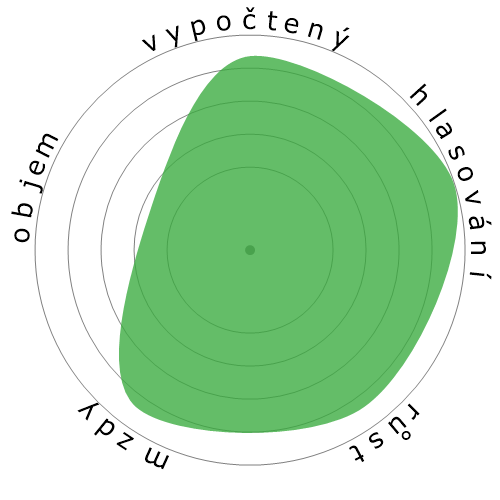Veterináři
Kam byste chtěli jít dál?
Nebo prozkoumejte tuto profesi podrobněji...


Co tato sněhová vločka ukazuje?
Co je to?
Práce hodnotíme podle čtyř faktorů. Jsou to:
- Pravděpodobnost automatizace
- Růst pracovních míst
- Mzdy
- Počet dostupných pozic
To jsou některé klíčové věci, o kterých byste měli přemýšlet při hledání práce.
Lidé také zobrazili
Vypočítané riziko automatizace
Minimální riziko (0-20%): Profese v této kategorii mají nízkou pravděpodobnost automatizace, protože obvykle vyžadují složité řešení problémů, kreativitu, silné mezilidské dovednosti a vysokou míru manuální zručnosti. Tyto pracovní pozice často zahrnují složité pohyby rukou a přesnou koordinaci, což činí replikaci požadovaných úkolů stroji obtížnou.
Další informace o tom, co tento skóre je a jak se vypočítává, jsou k dispozici zde.
Anketa uživatelů
Naši návštěvníci hlasovali, že je malá šance, že tato profese bude automatizována. Toto hodnocení je dále podpořeno vypočítanou úrovní rizika automatizace, která odhaduje 7% šanci na automatizaci.
Jaký si myslíte, že je riziko automatizace?
Jaká je pravděpodobnost, že Veterináři bude během příštích 20 let nahrazen roboty nebo umělou inteligencí?
Nálada
Následující graf je zobrazen tam, kde je dostatek hlasů k vytvoření smysluplných dat. Zobrazuje výsledky uživatelských anket v průběhu času a poskytuje jasný přehled o trendech nálad.
Nálada v čase (čtvrtletně)
Nálada v průběhu času (ročně)
Růst
Počet pracovních míst pro 'Veterinarians' se očekává, že se zvýší o 19,1% do roku 2033
Celkové zaměstnanost a odhadované pracovní nabídky
Aktualizované projekce jsou splatné 09-2025.
Mzdy
V 2023 byla mediánová roční mzda pro 'Veterinarians' 119 100 $, což je 57 $ za hodinu.
'Veterinarians' byli placeni o 147,8% více než je národní mediánový plat, který činil 48 060 $
Mzdy v průběhu času
Objem
K 2023 bylo v Spojených státech zaměstnáno 78 220 lidí na pozici 'Veterinarians'.
Tohle představuje kolem 0,05% zaměstnané pracovní síly po celé zemi.
Jinými slovy, přibližně 1 z 1 tisíc lidí je zaměstnán jako 'Veterinarians'.
Popis práce
Diagnostikovat, léčit nebo provádět výzkum nemocí a zranění zvířat. Zahrnuje veterináře, kteří provádějí výzkum a vývoj, kontrolují dobytek nebo se starají o domácí a společenská zvířata.
SOC Code: 29-1131.00
Komentáře (56)
In conclusion, STOP BEING LAZY! STUDY, WORK, and use AI to help in minimal cases, not in every aspect of your life.
Moving on. When you mention determining the age of a stray dog, you don't necessarily need to know their exact age to provide treatment or make certain diagnoses. As for your comment about "probably not knowing how much to feed each one," AI and robotics are astonishingly accurate in this aspect. They'll likely always have more data and accuracy than we do. And the notion that "they can't bathe them because they are robots"? Well, we've had waterproof robots for quite some time now.
So, yes, it seems full automation is on the horizon!
Those apps are just going to give rise to pet owners who doubt the doctor's diagnosis, and they are going to make irresponsible decisions thinking that they can treat their pets' ailments. In fact, it has already happened many times.
I work at a veterinary clinic, and there have been many "self-proclaimed veterinarians" with a degree in Google misdiagnosing their pets and giving harmful medications, such as feeding paracetamol to their dogs with high fever.
The app should be restricted to be used by licensed veterinarians and veterinary students, so as to prevent any misinformed or uneducated pet owners from misinterpreting or abusing the information from the apps.
In addition, some owners may have received the correct diagnosis from the app, but may proceed with the wrong treatment. A rise in antibiotic resistance will be observed when owners simply use antibiotics without understanding its consequences.
In fact, this is already happening without the involvement of AI. There are many online sellers selling antibiotics, and even some irresponsible people selling sedatives online, labeling such medications as "cat/dog fever medication" or "cat parvovirus medication".
Odpovědět na komentář